|
|
|
Sort Order |
|
|
|
Items / Page
|
|
|
|
|
|
|
| Srl | Item |
| 1 |
ID:
077441
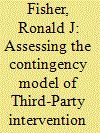

|
|
|
|
|
| Publication |
2007.
|
| Summary/Abstract |
The theory and practice of third-party intervention continue to develop in constructive directions and increasingly acknowledge the utility of unofficial methods directed more toward the subjective and relational aspects of international conflict. A previously developed contingency model of third-party intervention articulates the potential complementarity of these unofficial approaches (e.g. problem-solving workshops) with more traditional, official methods (e.g. power mediation) in pursuit of resolution. A comparative analysis of five cases of successful unofficial intervention in ethno-political conflicts identifies important contributions to the peace process. Descriptions of the interventions are followed by an identification of the transfer mechanisms and effects that carried the fruits of the unofficial interactions into the official domain. Each case is then reflected on the contingency model by identifying the stage of conflict escalation and the initiation, sequencing, and complementarity of interventions. The analysis provides some support for the validity of the model, although variations in the patterns of intervention indicate that strict applications of the model may be untenable. The model is thus seen as an idealized representation of a complex reality, but one that identifies some of the necessary interplay between official and unofficial interventions in order to effectively address intractable ethno-political conflicts.
|
|
|
|
|
|
|
|
|
|
|
|
|
|
|
|
| 2 |
ID:
078640


|
|
|
|
|
| Publication |
2007.
|
| Summary/Abstract |
Human rights abuses occur regularly around the world, affecting millions of citizens each year. Unfortunately, few studies have sought to examine the structure and role domestic perceptions play when such abuses transpire. The purpose of this article is to investigate the macro- and micro-level factors that shape the dynamics of human rights perceptions. The authors argue that perceptions are shaped not only by the human rights conditions within a country, but also by individual-level factors such as gender and political allegiance. Previous research on this topic has been limited to the analysis of a single survey question in fewer than 20 countries in Central and Eastern Europe. The authors expand the analysis to cover 55 countries from most regions of the world and examine alternative survey questions pertaining to human rights issues. The authors include variables that measure perceptions of general human rights conditions, as well as specific rights such as freedom from torture. They find linkages between expert-based measures of human rights conditions and perceptions of the general human rights situation in the country as well as for the more extreme aspect of torture. This suggests that the concept of human rights may share similar meanings in the minds of citizens and experts for at least some aspects of human rights values
|
|
|
|
|
|
|
|
|
|
|
|
|
|
|
|
| 3 |
ID:
077443
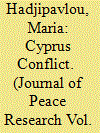

|
|
|
|
|
| Publication |
2007.
|
| Summary/Abstract |
survey in 2000-02 in both the Greek- and Turkish-Cypriot communities examines the beliefs about the root causes of the Cyprus conflict, the political culture, social attitudes, and future solutions. This article shows that both external and internal factors, both psychological and contextual, have played an influential role in the creation and perpetuation of the conflict - a view that challenges the selective official positions that define the problem as either a problem of external factors or merely an internal discord between the majority and minority population. The article highlights the complexity that characterizes intractable conflicts. It promotes the view that internal, contextual, and psychological factors are equally significant, as are legal and political factors, to be taken into account when addressing peacebuilding and future solutions. Some generalizations will be made with regard to the value of micro-level (i.e. societal studies) research in the field of conflict resolution and political psychology
|
|
|
|
|
|
|
|
|
|
|
|
|
|
|
|
| 4 |
ID:
077438


|
|
|
|
|
| Publication |
2007.
|
| Summary/Abstract |
This study re-examines the link between democratization and international conflict. It is founded on the argument that the greatest threat to a democratizing incumbent's tenure arises from the ability of the old authoritarian elite or their supporters to overthrow the new regime for failed foreign policies. Given this framework, the article differentiates among transitioning states based on the strength of the old authoritarian leadership vis-à-vis the new democratic government. The institutional and political balance between the transitional forces and the remnants of the ancien régime is, in turn, considered a function of the legacies of past democratic and authoritarian rule. Leaders in redemocratizing states, and those with a longer legacy of previous democratic rule, should be more likely to initiate disputes, as they are more institutionally insulated from the old authoritarian elite. On the other hand, a stronger legacy of authoritarian rule is expected to lead to a more cautious foreign policy. These expectations are tested in a quantitative analysis of international dispute behavior for all democratizing states from 1950 to 1990. The results strongly confirm the hypotheses, lending validity to the theoretical explanation in this study that attributes differences among democratizing states in their conflict propensities to their institutional past.
|
|
|
|
|
|
|
|
|
|
|
|
|
|
|
|
| 5 |
ID:
077439
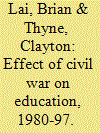

|
|
|
|
|
| Publication |
2007.
|
| Summary/Abstract |
This study examines the negative effects of civil wars and the post-civil war environment on educational expenditures and enrollment. Two causal mechanisms are considered. First, civil wars are likely to destroy a state's system of education through the loss of infrastructure and personnel. Second, a less deleterious cause may be the drawing away of funds for increased military expenditures to fight the civil war. Using UNESCO education data, the authors examine the percent change in educational expenditures and primary, secondary, and tertiary enrollment for all states from 1980 through 1997. The authors use a measure of when a state is in a civil war, a dynamic post-civil war measure, an interaction with military spending, and relevant control variables. The results indicate strong support for the notion that civil war is devastating for a system of education, as both expenditures and enrollment decline during periods of civil war. No support was found for the reallocation of education funds towards military spending during a civil war. These results highlight the importance of addressing the social costs of a civil war. Civil wars do not simply impose social costs because of increased funding to the military; rather, they severely disrupt a state's ability to provide even basic social services.
|
|
|
|
|
|
|
|
|
|
|
|
|
|
|
|
| 6 |
ID:
078639
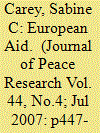

|
|
|
|
|
| Publication |
2007.
|
| Summary/Abstract |
Most studies on foreign aid and human rights have ignored the role of bureaucratic inertia in the allocation process. By not controlling for which developing countries have received aid in the past and how much aid they have received, continuity of aid flows remains unaccounted for. Additionally, previous studies have not allowed for a possible non-linear relationship between human rights and aid. This study investigates aid commitments from the European Commission, Germany, France, and the UK, paying attention to non-linear effects of human rights on aid commitments and the role of bureaucratic inertia. Using data from 1978 to 2003, the study investigates how past aid commitments, the level of human rights violations, and substantial changes in the respect for human rights influence the decision of European donors on whom to give aid to, how to choose a new recipient country that did not receive aid previously, and how much aid to give to countries that made it past the gatekeeping stage. Controlling for various donor interests and recipient needs, the results show that, despite donors' emphasis on human rights in official documents, the human rights situation in developing countries does not consistently shape European aid commitments. Only Germany commits less aid to more repressive countries. However, recent substantial improvements of the human rights records are rewarded by both Germany and France when deciding whom to give aid to. Bureaucratic inertia seems to be a major obstacle to the consistent implementation of human rights consideration in European aid allocation
|
|
|
|
|
|
|
|
|
|
|
|
|
|
|
|
| 7 |
ID:
078635


|
|
|
|
|
| Publication |
2007.
|
| Summary/Abstract |
International human rights language has swept across the landscape of contemporary world politics in a trend that began in the 1970s, picked up speed after the Cold War's end, and quickened yet again in the latter half of the 1990s. Yet, while this human rights `talk' has fundamentally reshaped the way in which global policy elites, transnational activists, and some national leaders talk about politics and justice, actual impacts are more difficult to discern, requiring more nuance and disaggregation. Importantly, there may be substantial cross-regional variations, due to varying colonial and post-colonial histories, and different trajectories in state-society relations. In some instances, there are also important differences in tone between qualitative and quantitative researchers. While many case-study scholars tend to be rather optimistic about the potential for human rights change, statistically inclined researchers often lean towards greater caution and, in some cases, downright skepticism about the trans-formative potential of international human rights law and advocacy. Given that international human rights treaties, human rights reporting, democracy, and elections do not always influence state practice in expected ways, the authors call for more regionally disaggregated studies, coupled with greater efforts to combine qualitative and quantitative research techniques
|
|
|
|
|
|
|
|
|
|
|
|
|
|
|
|
| 8 |
ID:
078638


|
|
|
|
|
| Publication |
2007.
|
| Summary/Abstract |
Since the 1980s, states have been increasingly addressing past human rights violations using multiple transitional justice mechanisms including domestic and international human rights trials. In the mid-1980s, scholars of transitions to democracy generally concluded that trials for past human rights violations were politically untenable and likely to undermine new democracies. More recently, some international relations experts have echoed the pessimistic claims of the early `trial skeptics' and added new concerns about the impact of trials. Yet, relatively little multicountry empirical work has been done to test such claims, in part because no database on trials was available. The authors have created a new dataset of two main transitional justice mechanisms: truth commissions and trials for past human rights violations. With the new data, they document the emergence and dramatic growth of the use of truth commissions and domestic, foreign, and international human rights trials in the world. The authors then explore the impact that human rights trials have on human rights, conflict, democracy, and rule of law in Latin America. Their analysis suggests that the pessimistic claims of skeptics that human rights trials threaten democracy, increase human rights violations, and exacerbate conflict are not supported by empirical evidence from Latin America
|
|
|
|
|
|
|
|
|
|
|
|
|
|
|
|
| 9 |
ID:
078637


|
|
|
|
|
| Publication |
2007.
|
| Summary/Abstract |
International human rights treaties have been ratified by many nation-states, including those ruled by repressive governments, raising hopes for better practices in many corners of the world. Evidence increasingly suggests, however, that human rights laws are most effective in stable or consolidating democracies or in states with strong civil society activism. If so, treaties may be failing to make a difference in those states most in need of reform — the world's worst abusers — even though they have been the targets of the human rights regime from the very beginning. The authors address this question of compliance by focusing on the behavior of repressive states in particular. Through a series of cross-national analyses on the impact of two key human rights treaties, the article demonstrates that (1) governments, including repressive ones, frequently make legal commitments to human rights treaties, subscribing to recognized norms of protection and creating opportunities for socialization and capacity-building necessary for lasting reforms; (2) these commitments mostly have no effects on the world's most terrible repressors even long into the future; (3) recent findings that treaty effectiveness is conditional on democracy and civil society do not explain the behavior of the world's most abusive governments; and (4) realistic institutional reforms will probably not help to solve this problem
|
|
|
|
|
|
|
|
|
|
|
|
|
|
|
|
| 10 |
ID:
077442


|
|
|
|
|
| Publication |
2007.
|
| Summary/Abstract |
Rule of law is usually analyzed exclusively in reference to domestic peace within the political entity. Yet, establishing a powerful independent legal system can have a major impact on peaceful relations between political entities. This article evaluates the Palestinian Authority's performance in creating democratic and legal institutions from its inception in the summer of 1994 until the outbreak of the armed conflict between Israel and the Palestinians in September 2000. Three potential explanations drawn from the literature on state formation are evaluated in explaining the outcome: the foreign intervention thesis blames the failure on the asymmetry of power between Israel and the PLO; the domestic structural claim is that the weakness of the legal system stems from the unwillingness of the ruler to limit his power; and the cultural argument claims that only Anglo-Saxon and European states are truly liberal and democratic. The findings show that the quest for power led to centralization of authority in the executive, despite valiant attempts by politicians and civil society to avert such an outcome, and the article identifies the types of obstacles that need to be overcome to transform the Palestinian entity into a democratic reality that would promote peaceful coexistence with its neighbors.
|
|
|
|
|
|
|
|
|
|
|
|
|
|
|
|
| 11 |
ID:
078636


|
|
|
|
|
| Publication |
2007.
|
| Summary/Abstract |
What influences the Northern media's coverage of events and abuses in explicit human rights terms? Do international NGOs have an impact, and, if so, when are they most effective? This article addresses these questions with regression analysis of human rights reporting by The Economist and Newsweek from 1986 to 2000, covering 145 countries. First, it finds that these two media sources cover abuses in human rights terms more frequently when they occur in countries with higher levels of state repression, economic development, population, and Amnesty International attention. There is also some evidence that political openness, number of battle-deaths, and civil societies affect coverage, although these effects were not robust. Second, it finds that Amnesty International's press releases appear to have less impact on media coverage when discussing abuses in countries that are central to the media's zone of concern. Indeed, Amnesty's press advocacy may be more effective when addressing violations in lesser-noticed countries. The article attributes this to the saturation of coverage of abuses in highly mediatized countries. Cumulative attention by multiple journalists and others raises a country's media profile but also makes it more difficult for any one voice to be heard. The authors conclude that Amnesty's press advocacy may have greater media impact when focusing on abuses in countries located away from the media's core areas of concern. Overall, the authors are encouraged by the Northern media's sensitivity to actual patterns of repression and to Amnesty's lobbying, since both indicate that the media is potentially a useful ally in efforts to combat abuses worldwide. Yet, the discouraging effects of poverty on the media's human rights coverage are cause for concern
|
|
|
|
|
|
|
|
|
|
|
|
|
|
|
|
| 12 |
ID:
078641
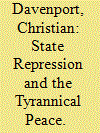

|
|
|
|
|
| Publication |
2007.
|
| Summary/Abstract |
Existing literature on state repression generally ignores the diversity that exists within autocracies. At present, different political systems are collapsed together, leaving unique approaches to political order unexamined. This limitation is important for policymakers, activists, and everyday citizens around the world seeking new ways to reduce government coercion. Within this study, the author explores an alternative path to decreasing repression - a `tyrannical peace'. Examining 137 countries from 1976 to 1996, he finds that single-party regimes are generally less repressive than other autocracies. Results also show that military governments decrease civil liberties restriction and the end of the Cold War has varied influences on repression, depending upon the form considered and whether this variable is interacted with another. There are thus alternative routes to peace, but these routes are not equally robust. The implications of this analysis are threefold. First, those interested in understanding why states restrict civil liberties and violate human rights must disaggregate their conceptions of system type and repression. Second, policymakers must adjust their approach to reducing state repression according to the type of authoritarian government they are confronted with. Third, advocates for human rights must accept that, in lieu of full democratization, alternatives exist.
|
|
|
|
|
|
|
|
|
|
|
|
|
|
|
|
| 13 |
ID:
077440


|
|
|
|
|
| Publication |
2007.
|
| Summary/Abstract |
Existing research has related civil war primarily to country-specific factors or processes that take place within individual states experiencing conflict. Many contemporary civil wars, however, display a transnational character, where actors, resources, and events span national boundaries. This article challenges the 'closed polity' approach to the study of civil war, where individual states are treated as independent entities, and posits that transnational factors and linkages between states can exert strong influences on the risk of violent civil conflict. Previous research has shown that conflicts in a state's regional context can increase the risk of conflict, but the research has not distinguished between different varieties of transnational linkages that may underlie geographic contagion, and it has failed to consider the potential influences of domestic attributes. The article develops and evaluates a series of hypotheses on how transnational factors can influence the risk of conflict and the prospects for maintaining peace in a conditional autologistic model, including country-specific factors often associated with civil wars. The results suggest that transnational linkages between states and regional factors strongly influence the risk of civil conflict. This, in turn, implies that the risk of civil war is not determined just by a country's internal or domestic characteristics, but differs fundamentally, depending on a country's linkages to other states.
|
|
|
|
|
|
|
|
|
|
|
|
|
|
|
|
|
|
|
|
|